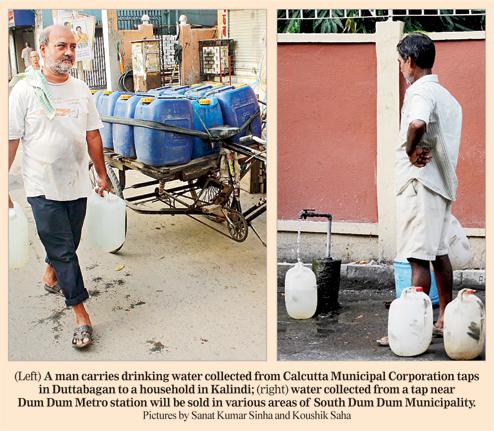
Residents in south Dum Dum, a fast growing urban patch in northeast Calcutta where countless multi-storey apartment buildings have come up in the past few years, begin their mornings waiting for the bhariwala (drinking water supplier) to turn up.
The bhariwalas are their only source of drinking water, which they have to buy at Rs 7 for a 10-litre container.
The area has one of the busiest Metro stations, small shopping malls and a clutch of prominent schools. The airport is only about 5km away. Dum Dum can boast of many things Calcutta can - except drinking water.
For about a month, in the run up to Saturday's civic elections, the Trinamul Congress has been highlighting its success in building community halls and beautifying the place. The residents, however, wanted to hear more about attempts at solving their drinking water problems.
" Arey baba khaoar jol nei aar shukhno gola niye community hall-e boshey aami gaan shunbo (If I am thirsty and do not have drinking water, how can I listen to songs sitting in a community hall)?" asked Pinky Karmakar, a resident of Jawpur Road, barely a five-minute walk from Dum Dum Metro station.
"We have everything at hand. Metro station, road transport and shopping malls. But there is no water to drink."
Echoing the homemaker, Samar Saha, a Tea Board employee and resident of the nearby Madhugarh area, said the water supplied by South Dum Dum Municipality was so bad that even a purifier failed to make it drinkable. "The iron and salt content of the water is extremely high. My purifier, a low-end one, is of no use in treating the water. How many people can afford a high-end purifier?" he asked.
The problem - most severe in the eight wards from Dum Dum Metro station to Nagerbazaar - might have been solved had Trinamul agreed to levy water tax, which would have been lower than the money the residents pay to buy water. Mamata Banerjee's party has steadfastly refused to impose water tax anywhere in the state.
At the inauguration of the Dhapa water treatment plant off the Bypass in December last year, panchayat minister and former Calcutta mayor Subrata Mukherjee had admitted that it was painful to give water free to citizens. "It is painful but we are still doing this. This is possible only in Bengal. No other city in India gets such good and adequate water supply," Mukherjee said in appreciation of his leader's policy.
As Calcutta mayor, Mukherjee had wanted to levy water tax but couldn't because of Mamata's objections.
A senior CMC engineer said the revenue from water tax could be spent on improving the water supply network and other infrastructure. "The water tax, apart from helping upgrade the infrastructure, will stop rampant wastage of water. You only care for something if you pay for it," he said.
In Dum Dum, a move to sort out the problem was initiated by the heads of three municipalities - North Dum Dum, Dum Dum and South Dum Dum - in 2009. All three were run by the CPM then.
"I, along with two other chairmen, went to Delhi and met the JNNURM authorities. They agreed to sanction a Rs 312-crore water supply project on condition that we collect water tax from beneficiaries. We built a main reservoir and several tanks in the area as part of the project. But before we could proceed further, the CPM lost Dum Dum and South Dum Dum municipalities," said Srihir Bhattacharya, then chairman of South Dum Dum Municipality.
After Trinamul came to power in the two municipalities in 2010, the authorities announced no water tax would be levied. "It was Trinamul MP Saugata Roy who then intervened and kept the project alive by convincing the JNNURM authorities that the water tax issue would be discussed later," said an official of South Dum Dum Municipality.
Bhattacharya said the installation of underground pipelines started after Trinamul came to power but the progress was poor and no one knew when the project would be completed.
South Dum Dum Municipality chairperson Anjana Rakshit (Trinamul Congress) said the project had to be reworked, which would delay its completion. "There are some problems that are being rectified. We expect the problem will be solved within two or three months of the new board taking charge," she said. "We will give adequate water without levying tax."
The elections to the three municipalities are being held nine months behind schedule. An administrator, a bureaucrat, has been running the civic bodies since the boards' terms expired nine months ago.
The problem has kept the profession of selling drinking water alive. There are at least 150 bhariwalas, who collect water in containers from road-side taps or leakage points in the pipelines of the Calcutta Municipal Corporation's Tallah water supply project.
"I survive with my five-member family because of the drinking water problem in the South Dum Dum municipal areas. I supply at least 1,200 litre water daily and earn Rs 21,000-23,000 a month," Bijoy Das said.
"The 150-odd bhariwalas here supply at least 100,000 litre water to the people of south Dum Dum every day," said Ganesh Sarkar, another bhariwala.
The CPM knows that drinking water is a problem but seems to have failed to exploit it in its campaign. The affected areas include places where people migrated from Bangladesh long ago and were once Left bastions.
"These areas were our strongholds. Many residents had shifted their loyalty to Trinamul before 2011 but they are unhappy. We failed to make the drinking water problem an issue because of our poor organisation. But if there is a fare election, people will deliver their verdict against Trinamul," said a local CPM leader.

